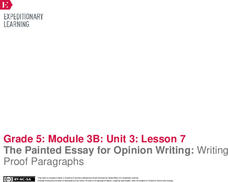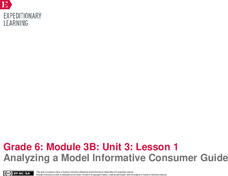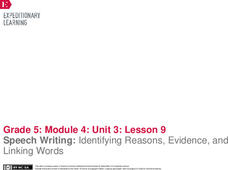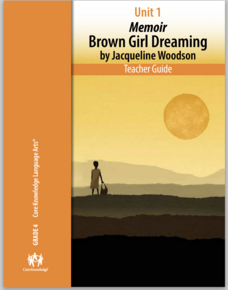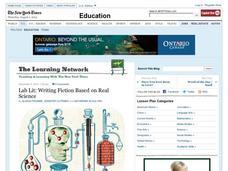Curated OER
Who Knows? Your Privacy in the Information Age
Teach young adults how to become advocates for their privacy in the modern information age. In a series of five lessons, learners explore their beliefs and opinions about privacy vs. the actual laws regarding who has the right to access...
Dream of a Nation
Read, Watch, Write for Pathos, Logos and Ethos
Encourage your young citizens to make a difference. Using Tyson Miller's Dream of a Nation: Inspiring Ideas for a Better America as a starting point, class members watch documentaries, investigate issues, and then write letters to...
EngageNY
Revising: Strong Conclusions for My Accessing Books Around the World Informative Paragraph
It's important that writers leave their readers with a strong and satisfying conclusion. Help your young writers develop the skills to compose a concluding sentence with the steps outlined here. After class members have had a chance to...
EngageNY
Writing to Inform: Analyzing a Model Using a Rubric
Learn to write right. Scholars analyze the model essay Adversity Faced by Townspeople in the Middle Ages. They discuss the essay and make annotations working with an elbow partner. Learners then take another look at the essay using a...
Fluence Learning
Writing About Informational Text: The Dred Scott Decision
Looking for a performance assessment that asks individuals to demonstrate their competency in writing about informational text? Use Frederick Douglass' essay "On the Dred Scott Decision," and an excerpt from Abraham Lincoln's 1857 speech...
EngageNY
The Painted Essay for Opinion Writing: Writing Proof Paragraphs
It's time to proof read! Pupils read and analyze proof paragraphs from a model essay. They then practice writing their own proof paragraphs to express an opinion about offshore oil drilling.
EngageNY
Resource Materials and Gathering Information: Reading Another “Choice” Text from the Research Folder
Look it up. Scholars use a dictionary and thesaurus to verify the meaning of the research vocabulary words they defined in the previous activity. They then use sticky notes to write a synonym for each word. Finally, individuals choose a...
EngageNY
Speech Writing: Identifying Criteria for a High Quality Conclusion
Learning is never-ending. Scholars learn about effective conclusions as they continue watching a video of an opinion speech. After analyzing the speech's conclusion, they work in small groups to write an ending for their own speeches.
EngageNY
The Painted Essay for Opinion Writing: Developing a Conclusion and Adding Linking Words
Let's get colorful! Scholars use the Painted Essay technique to analyze and color code the conclusion of a model essay. Working in small groups, pupils then write a conclusion paragraph for their draft editorials about offshore drilling.
EngageNY
Analyzing a Model Informative Consumer Guide
What do consumers need to know about overfishing before buying fish? Scholars consider the question as they prepare for their performance task, which is to create a consumer guide for people about purchasing fish responsibly. After...
EngageNY
Speech Writing: Identifying Criteria for a High-Quality Introduction
Using a helpful resource, pupils watch a TED Talk of an opinion speech as they consider the criteria for a high-quality introduction. Scholars then engage in a shared writing process with the teacher to practice writing the introduction...
EngageNY
Speech Writing: Identifying Reasons, Evidence, and Linking Words
Enjoy the view. Scholars continue viewing a video of an opinion speech, this time identifying the supporting evidence the speaker employs. After watching, they work in small groups on their shared writing projects, crafting a body...
EngageNY
End of Unit 3 Assessment: Writing a Research Synthesis
Ready, set, write! Scholars work on the end-of-unit assessment by completing a writing prompt. They then look at the model performance task from instructional activity two to create a rubric for scoring the exercise. Using turn and talk,...
K20 LEARN
Let Us Start The Lettuce Club (Or Not): Writing A Thesis Statement
Let us be frank! Writers learn that crafting a thesis statement is not that difficult if one peals back the layers. After watching several videos about the elements of a thesis, class members read the article "Lettuce Club helps students...
Core Knowledge Foundation
Unit 4: The Renaissance
The Renaissance is the theme of a five-week unit designed to boost reading comprehension, spelling, vocabulary, and expository writing skills. Scholars listen to and discuss daily readings and engage in skills practice activities...
Core Knowledge Foundation
Unit 1: Memoir - Brown Girl Dreaming by Jacqueline Woodson
The memoir, Brown Girl Dreaming by Jacqueline Woodson, is the focus of a unit designed for fourth graders. Scholars begin each lesson with a warm-up, then listen to a read-aloud of a section of the book. Pupils complete word work,...
EngageNY
Writing to Inform: Colonial Trades
Fourth graders who are studying life in colonial America engage in an instructional activity that has them create a "Help Wanted" ad that would have been written by a master craftsperson from back in the day. They utilize a graphic...
Core Knowledge Foundation
Unit 6: American Revolution
The American Revolution is the theme of a five-week unit that focuses on reading, grammar, morphology, and writing. Scholars read and respond to texts, practice spelling and word work, and write paragraphs. Assessments gauge comprehension.
Scholastic
Writing to a Historical Poet
Poetry is a very personal and introspective art form. Give your class the opportunity to understand how a poet's voice can speak to them on a personal level, and that every reader can respond to an author differently. After a poetic...
The New York Times
Writing Fiction Based on Real Science - NYTimes.com
Refuse to alienate your scientific-minded young scholars during your creative writing unit. Learners explore how literary writing can reflect observable fact, and be based in actual science. The links include examples of fiction and...
The New York Times
Fiction or Nonfiction? Considering the Common Core's Emphasis on Informational Text
Nothing aids in comprehension more than an explanation and understanding of why things are done. Address why the Common Core requires the reading percentages that it established and analyze how this affects your readers. Learners read...
EngageNY
Peer Critique: Historical Accuracy of Ideas and Vocabulary
Promote collaboration in the classroom with a historical fiction instructional activity. Fourth graders partner up and read the other's narrative to give feedback on vocabulary choice and the accuracy of historical information. After...
Core Knowledge Foundation
First Grade Skills Unit 7
The last unit in the series by Core Knowledge focuses on alternative spellings, nouns, verbs, conjunctions, subject-verb agreement, using commas in a series, constructing sentences, and following the writing process while writing...
Curated OER
Writing a News Article
Join the newspaper business with a series of lessons and exercises focused on elements of journalism. The packet focuses on distinguishing fact from opinion, writing effective headlines, sequencing events, and editing and proofreading a...
Other popular searches
- Informative Writing Prompts
- Informational Writing Snakes
- Informational Writing Topics
- Informative Writing Lessons
- Informative Writing Samples
- Teaching Informative Writing
- Informational Writing Plan
- How to Informative Writing
- Informative Writing Grade 6
- Informational Writing Unit
- Informative Writing (Sample)
- Writing Informative Writing







